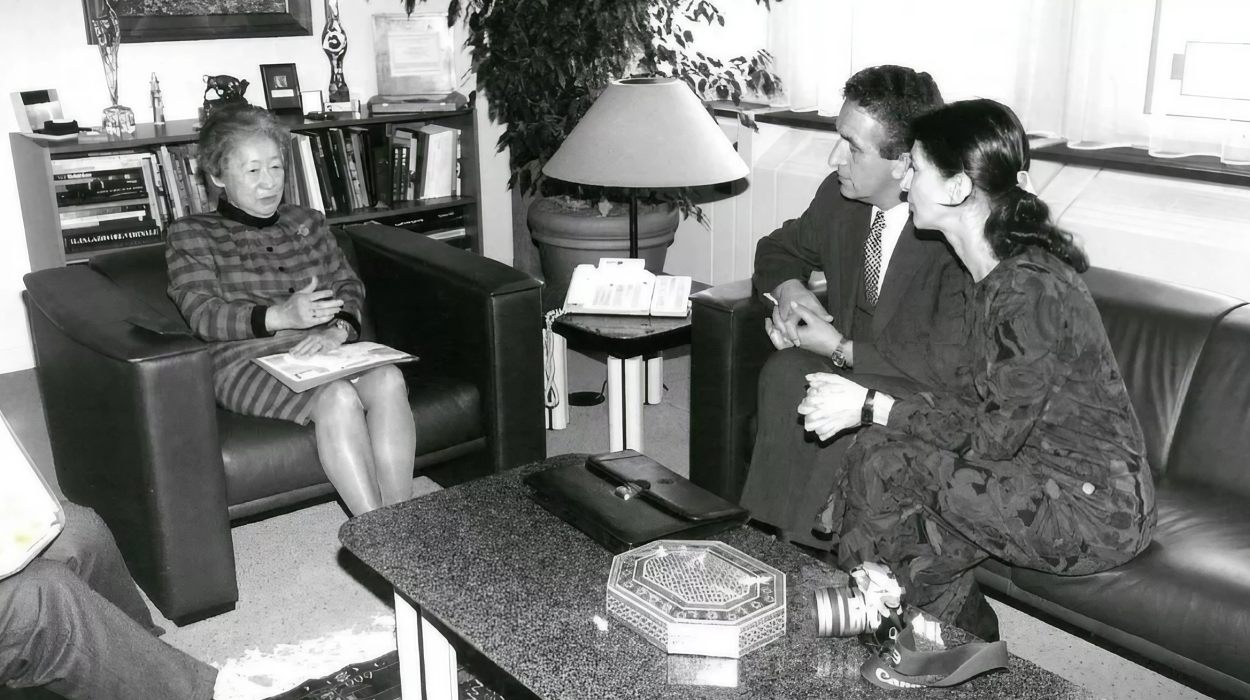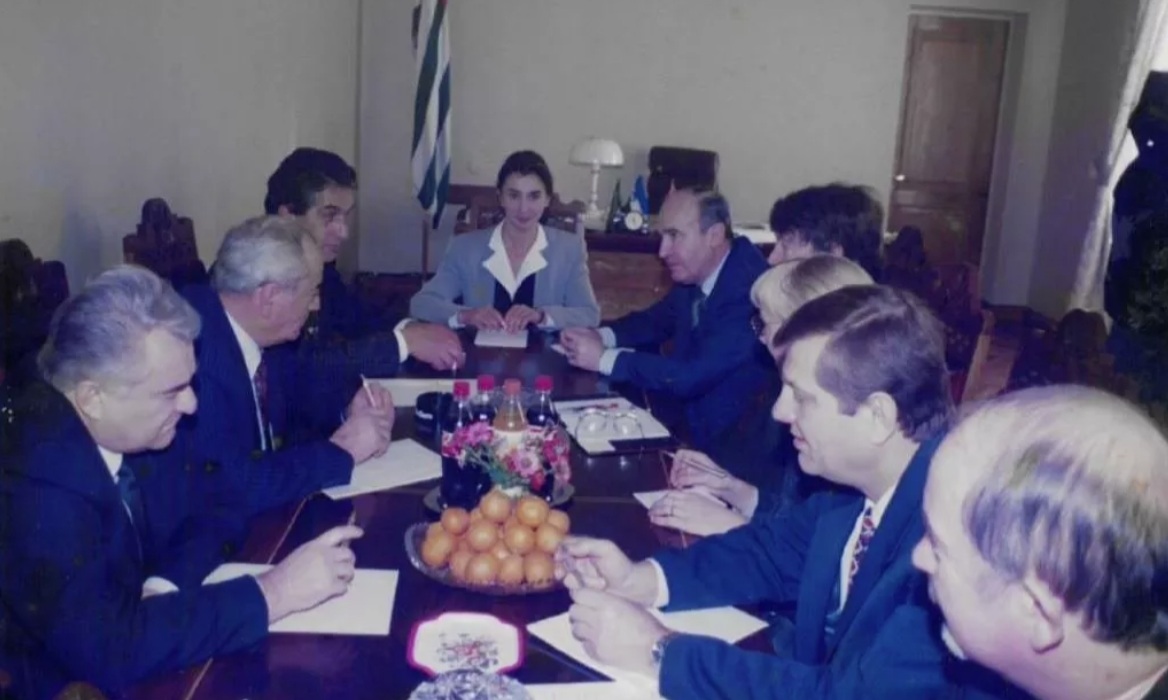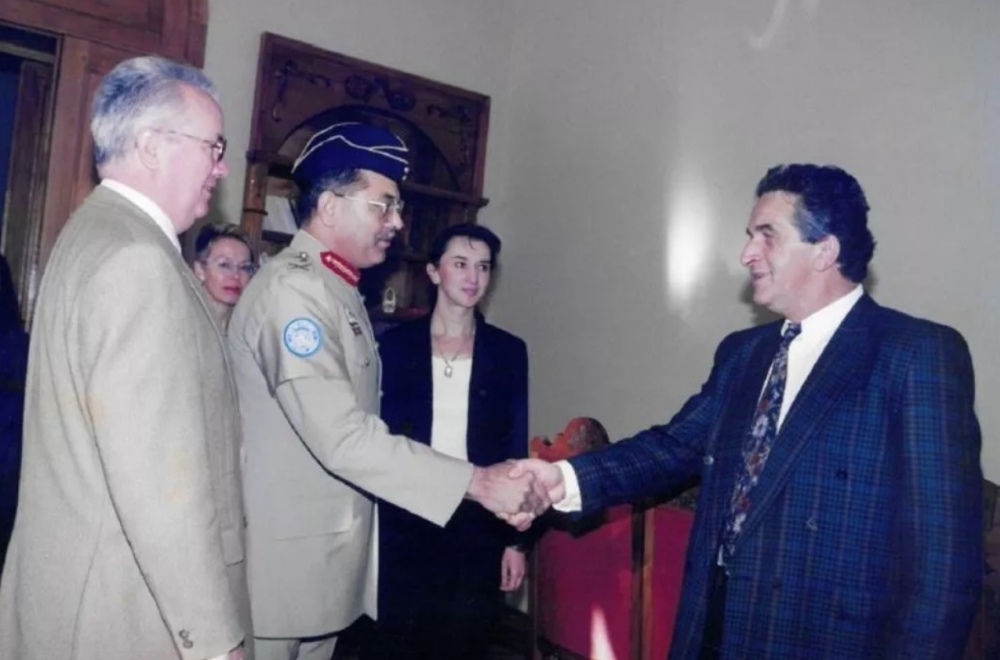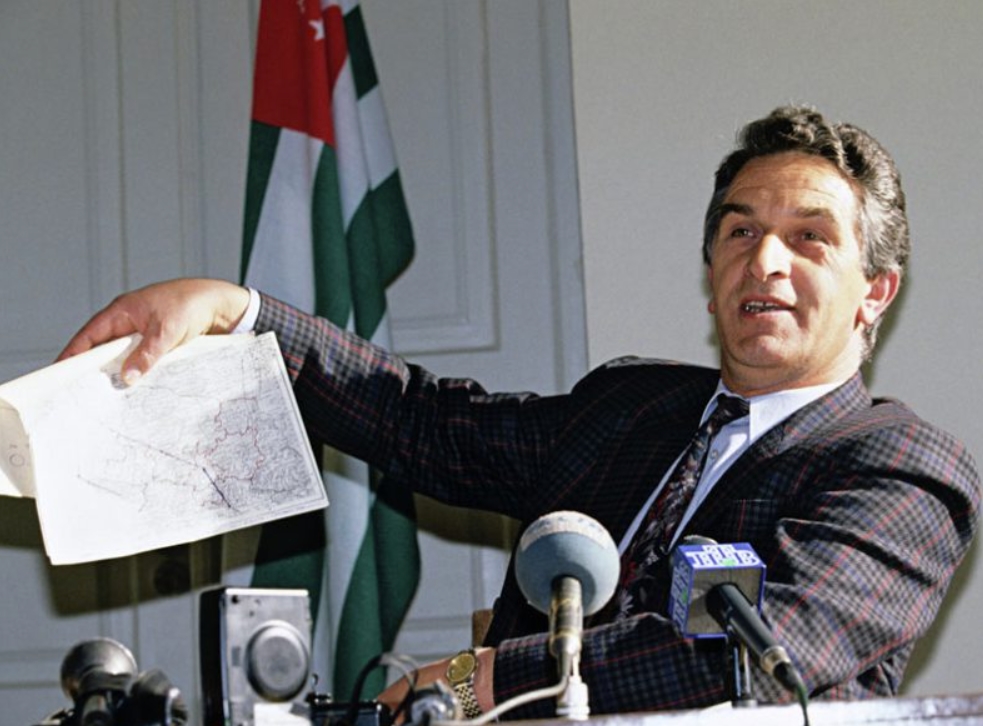Anna and the President: A Translator's Story

Meeting with UN High Commissioner for Refugees Sadako Ogata in Geneva 1997. © Photo: Anna Keropyan
Anna Keropyan served as the translator for the first President of Abkhazia, Vladislav Ardzinba, from 1995 until the end of his presidency. During the most challenging and critical negotiations, she was by the leader's side, witnessing first-hand how he defended the interests of the country during one of the most difficult periods in Abkhazian history.
Anna brought an album to our meeting, filled with memories of meetings with global leaders, tough negotiations, difficult decisions, and even jokes. Vladislav Ardzinba was remembered not only as a president but as a person.
"This is a funny story; look, I am sitting at the head of the table in the president's place. Vladislav himself is sitting on my right, with representatives of Abkhazia next to him, and across from them are representatives of France, Germany, the USA, Great Britain, and Russia. They were ambassadors in Georgia at the time, part of a group called the 'Group of Friends of Georgia' under the UN Secretary General. Eventually, it would be renamed the 'Group of Friends of the UN Secretary General.' But my being there was no accident. The negotiations were difficult; one of the ambassadors pursued an openly anti-Abkhaz policy and never wavered from his stance. That's when Vladislav turned to me and said, 'Anna, could you sit in my place when I answer this ambassador? I want to look him in the eye,'" recalls the translator.

Meeting with a group of Friends of the UN Secretary General 1996.
First Meeting
Anna Keropyan first met Vladislav Ardzinba in 1993. She was returning home from Moscow with a German journalist who was scheduled to interview the president. It was late, and Vladislav Ardzinba was very tired, but the interview took place. Impressed by the President of Abkhazia's personality, journalist Silbia Khodela left Gudauta, while Anna returned home to Sukhum.
The next meeting took place in Moscow. Ardzinba was scheduled to meet Lord Avebury from Great Britain. Anna was contacted by the Ambassador of Abkhazia, Igor Akhba, and asked to serve as an interpreter at this meeting.
"Human rights and the issue of refugees returning to Abkhazia were discussed at the meeting. I remember then understanding the scale of Vladislav Ardzinba and realising that this person had no boundaries. Like many before me, I left deeply impressed," she says.
Anna worked as a translator in Moscow, and in 1995 she returned to Abkhazia with the same German journalist for another interview with the president. By that time, Anna had applied for a job at the UN and was awaiting a response.
"After the interview, Vladislav Ardzinba offered me a job. I said, 'You know, I have already applied for a job at the UN, and I'm waiting for their response.' He replied, 'Forget the UN, write an application, I'm hiring you.' Of course, I was proud and happy, and I no longer considered any UN job, even though they invited me a week later," Anna continues.

Meeting with the UN Secretary-General's Special Representative Liviu Bota and the Chief Military Observer of the UN Mission in Georgia/Abkhazia, General Bajwa, in 1998. © Photo: Anna Keropyan
Against the Whole World
According to Anna, it was a time when the entire world seemed to be against little Abkhazia. Negotiations occurred daily, but war could break out at any moment. It was a time when all the powers that be exerted unprecedented pressure on Abkhazia, and it was necessary to fight back. In such a situation, becoming the president's interpreter was a tremendous responsibility.
There were also trips to Geneva. Several times, the Abkhaz side left the negotiating table, disagreeing with the documents or statements from either the Georgian side or the UN. It was a form of protest.
+ The leader of the nation and father of Victory: memories of Vladislav Ardzinba
+ 14 August 1997, Vladislav Ardzinba - in Tbilisi. How did this come about?
+ Vladislav Ardzinba: Historian who became the first President of Abkhazia
"Despite the difficult and high-stakes negotiations, as a translator, I never felt embarrassed. I translated for journalists calmly, but during political discussions, I experienced excitement that lasted no more than five minutes. I saw a strong personality beside me, and I gathered myself a little by imitating him, realising that there was no room for nervousness and that I had to pull myself together. Soon, I began to translate quickly and simultaneously. It was fascinating to translate for him. Sometimes, translating dull, uninteresting speeches can be tedious, but that wasn't the case here. He discussed such topics and drew such comparisons from history. There was room for humour, facts, and arguments," she continues.
"There are many presidents in the world, but few leaders, and you [Ardzinba] are indeed the true leader of your country."
― Burak Gursel, Turkish Ambassador to Georgia
Difficulties in Translation
In UN documents, Vladislav Ardzinba was not presented as the President of Abkhazia; instead, his status was noted as the leader of the separatist country. The institutions of power were also omitted, using the phrase "the so-called government."
"At one of the meetings with Turkish Ambassador Burak Gursel, Ardzinba expressed his dissatisfaction with this matter. 'I think you are afraid of us,' he said, referring to the use of 'leader' instead of 'president,' as that was the reality. To which the Turkish ambassador replied, in my opinion, very wisely: 'There are many presidents in the world, but few leaders, and you are indeed the true leader of your country,'" she continues with a smile.
Difficult negotiations took place in 1999 in Istanbul. The Abkhaz delegation met again with the "friends of the UN Secretary General." The delegation included Anri Dzhergenia, Sergey Shamba, and Sergey Bagapsh, with Vladislav Ardzinba leading the negotiations. The issue of the return of refugees to Abkhazia was discussed at the meeting.

According to Anna, for two hours, the President of Abkhazia explained the reasons for the impossibility of returning refugees. He spoke about the aggression of refugees against the country's population and the inability to guarantee the safety of these people upon their return after the bloodshed and genocide of the Abkhaz people. The discussion could only focus on the Gal region.
"For two hours, I was busy translating, and I saw how he defended his position under extreme tension. And here, I want to note the role of Sergei Shamba. He began to support Vladislav's position, thereby giving our president a little respite. He demonstrated that this was not just the position of our president, but the position of the entire Abkhazian people. Our leader simply voiced it. It was important to show this because the Georgian media claimed that this was the separatist leader's attitude and solely his policy. However, Sergey Shamba demonstrated that it is the position of the whole people," says the translator.
Many facts and arguments were cited, but nothing influenced the ambassadors, who remained unshakable in their positions. Arguments did not help, she added.
In addition to simultaneous translations, Anna Keropyan studied and translated documents.
"Vladislav Ardzinba told me, 'Sit down, Anna, here I have a Russian text, UN documents, and here is the English version. Let's sit down and start comparing.' You put a comma in the wrong place, and the meaning changes, and they would always insert some kind of word. But Vladislav Ardzinba knew these subtleties, spoke English perfectly, and read everything carefully," says Anna.
According to her, despite the difficult times and the pressure that the whole world put on Abkhazia, the negotiations were conducted by competent people who knew how to defend their positions without compromising their integrity.
"I am proud of that period in my life, and I was proud that Vladislav Ardzinba was sitting on one side of me and Sergey Shamba on the other. Two intellectuals, two historians. Sergey Shamba supplemented what Vladislav was talking about, supported him in negotiations, as did Anri Dzhergenia. There were people who knew the material very well and knew how to competently defend their position," she added.